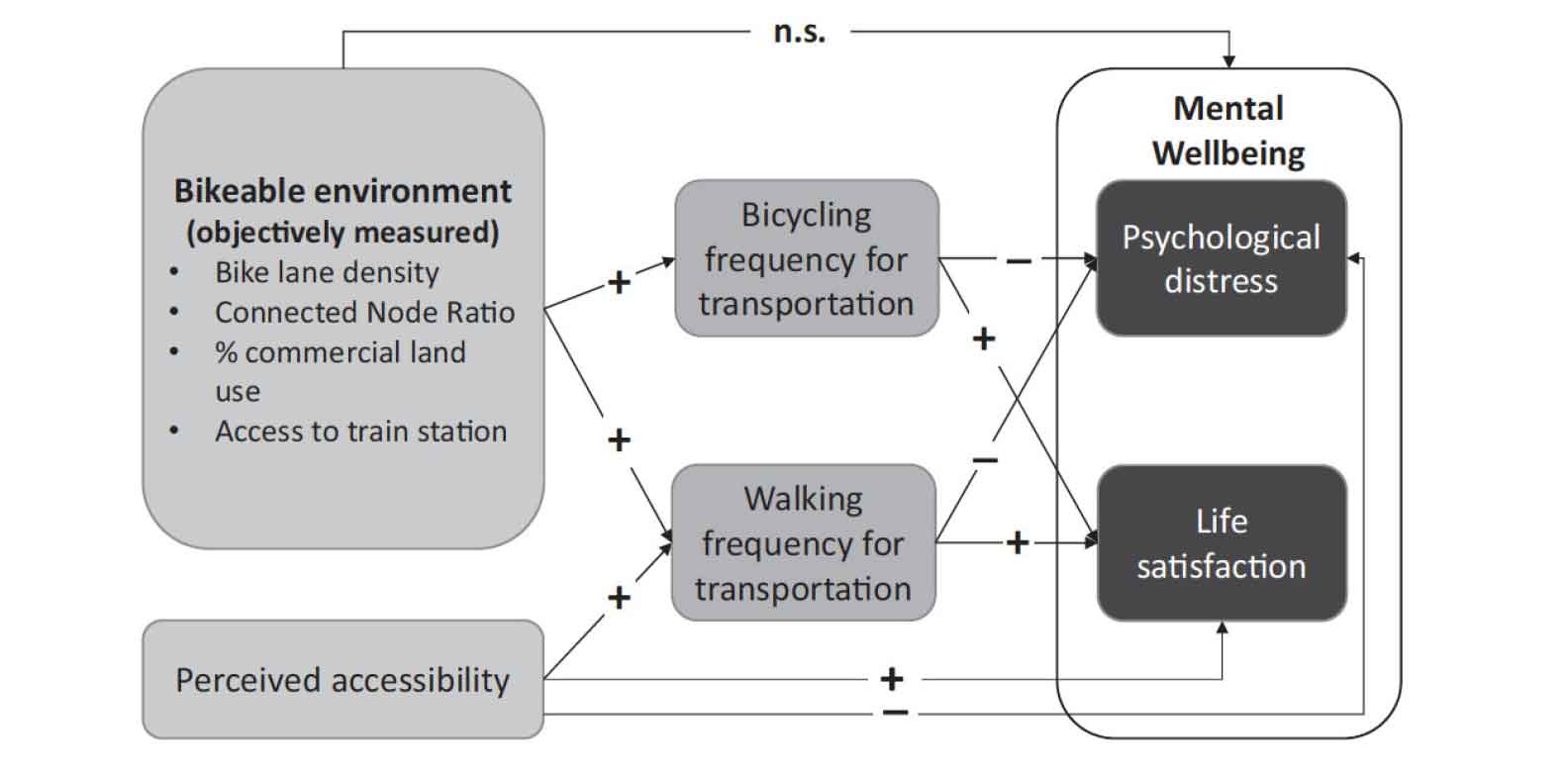Uncovering JAPA
The Built Environment, Bicycling, and Mental Wellbeing

Is utilitarian bicycling good for mental well-being? You might say without much hesitation, "Of course!" Indeed, many bicycle programs have touted cycling's mental health benefits, such as improving mood and preventing depressive symptoms.
However, many of these claims are based on little empirical evidence, as they often refer to the mental health benefits of physical activity overall. Furthermore, bicycling for transportation may cause problems for mental health conditions if people have no choice but to ride on the road where there is no proper safety infrastructure.
Biking Enhances Mental Health, Survey Shows
In the article "Utilitarian Bicycling and Mental Wellbeing" (Journal of the American Planning Association, Vol. 88, No. 2), authors Liang Ma and Runing Ye explored the relationships between the built environment, utilitarian bicycling, and mental well-being. They further investigated how the association between utilitarian bicycling and mental well-being varies by gender and age.
They used a large, representative survey (N = 30,105) conducted in Victoria, Australia, to understand people's walking and bicycling behavior, the status of their mental well-being, and socio-demographic characteristics.
The final sample included 30,105 respondents distributed in 1,833 neighborhoods in 79 local government areas (LGAs). They also pulled out the built environment characteristics in each survey participant's neighborhood from DataVic, Victoria's open data platform.
They found a statistically significant association between utilitarian bicycling behavior and mental well-being.
More specifically, they found that utilitarian bicycling is negatively associated with psychological distress and positively associated with life satisfaction. Beyond validating the widely-held belief that bicycling leads to better mental health, the following findings were particularly highlighted.
Benefits for women and older adults
Utilitarian bicycling's effect on mental well-being is greater in women and older adults.
Though bicycling frequency leads to better life satisfaction in both women and men, the association turns out to be greater for women. Based on the evidence of this study and many other previous studies, women are more likely to suffer mental health issues than men. As such, the research implies the importance of engaging women in bicycling, not only for gender equity but also for enhancing mental well-being.
Those over 65 who cycled more suffered from less psychological distress. However, in many countries bicycling participation rates of older adults are low. Planners should engage older adults more actively in local bicycling planning to better understand and accommodate their needs.
Built Environment Impacts
Higher bike lane density, street connectivity, and accessibility facilitate utilitarian bicycling.
Built environment characteristics — bike lane density, street connectivity, and accessibility — were positively correlated with bicycling frequency. On the other hand, hilliness was negatively correlated with bicycling frequency.
These results provide insights into what built environment characteristics planners should prioritize in developing interventions to promote utilitarian bicycling. Dedicated bicycling infrastructure, connected street networks, mixed land use, and bicycling-friendly design transit stations are important.
mental wellbeing
The built environment contributes to better mental well-being by promoting bicycling and walking.
The built environment variables examined in the research were indirectly associated with psychological distress and life satisfaction, mediated through enhanced walking and bicycling behavior. That is to say, those who lived in neighborhoods with relatively higher bike lane density, better street connectivity, higher percentages of commercial land use, and more train stations, were likely to have better mental health as they tended to walk and bike more.

Figure 2. The relationships between the built environment, utilitarian bicycling, and mental well-being.
Planning for a Joyful Cycling Experience
The research provides novel evidence of the public health benefits of urban planning that promotes utilitarian bicycling. Even though the research is based on a survey specifically conducted in Victoria, Australia, the findings relate to a wide range of urban contexts.
This article inspired me to ponder a lot about how planning can enhance the psychological pleasure of bicycling beyond the conventional concerns about bicycling safety. In planning for a more pleasurable bicycling experience, integrating the perspectives of women and older adults could be key. I believe better reflecting their voices in planning will make cities more inclusive and happier for all.
Top image: franckreporter/E+/gettyimages.com


